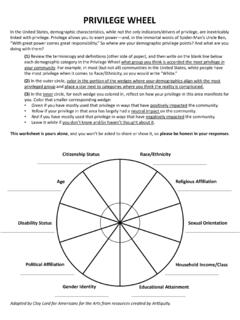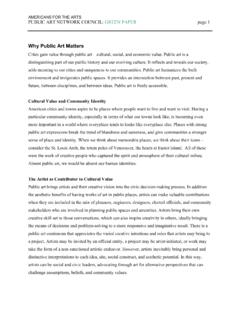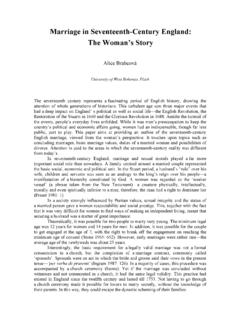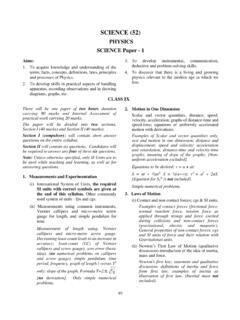Transcription of The Role and Importance of Cultural Tourism in Modern ...
1 10 The Role and Importance of Cultural Tourism in Modern Tourism industry J nos Csap University of P cs, Institute of Geography Hungary 1. Introduction The main aim of this chapter is to thoroughly present the role and positions of Cultural Tourism , as one of Modern Tourism industry s most dynamically developing branch, in today s global Tourism market both from the theoretical and the practical point of view. With the definition of Cultural Tourism , we try to point at the complex problems of the term as it is proved to be a controversial issue in Tourism , since there is no adequate definition existing. In the absence of a uniformly accepted definition, Cultural Tourism can be characterised both from the perspective of supply and demand and also from the point of view of theoretical and practical approach. We can state that Cultural Tourism is a very complex segment of the Tourism industry , its supply is diverse and versatile.
2 The future positions of the discipline will probably be strengthened both directly and indirectly as with the change of the recreational needs the aim to get acquainted with the Cultural values is strongly increasing. Mass Tourism though will of course never loose its positions, but tourists taking part in the supply of the 4S will become visitors with more diversified needs concerning Cultural interest. So apart from the theoretical discussion, the chapter aims to provide an insight into the Tourism segments and attraction structure of Cultural Tourism as well. 2. The problems and definition of the term culture and Cultural Tourism Defining the term culture To define Cultural Tourism first of all we have to determine the meaning of the term culture. In this chapter we do not intend to investigate this very complex concept from different aspects and approaches or with a very detailed analysis but we wish to provide an insight and a starting point since we feel that the determination of the context provides us the basics for the researches on Cultural Tourism .
3 So in this approach first of all we intend to highlight one of the first scholars who dealt with the identification of culture by providing a classic approach which is widely accepted in the scope of social sciences researchers. According to TYLOR (1871) culture is that complex whole which includes knowledge, belief, art, morals, law, custom, and any other capabilities and habits acquired by man as a member of society (Tylor, 1871.) This definition seems to be a Strategies for Tourism industry Micro and Macro Perspectives 202 favourable approach to our investigations as well since the determination can be used in a wide content opening the possibilities to the possible connection with other disciplines, and at the same time the definition is exact and concrete. When analysing the meaning of culture we also would like to provide the approach and definition of the Webster s New Encyclopaedic Dictionary which states that culture is the characteristic features of a civilisation including its beliefs, its artistic and material products, and its social institutions.
4 (Webster s New Encyclopaedic Dictionary, p. 244) On the other hand we also wish to explain that there is a strong and maybe ever lasting debate on the definition of this very complex term. Anthropology originally stated that culture and cultures are unique bounded entities with limits and specific characteristics. Cultures were static, in that they could be captured by anthropological analyses. Their customs, habits, mores, relationships, uniquenesses could all be detailed, and in doing so, the ways in which each culture was separate from all others could be seen. ( ckenned1 ) On the other hand recent trends of the research on culture show that culture is not a bounded, unchanging entity. Cultures are not separated from each other providing a chance to continuously interact and contact with each other. Of course this trend would also strongly determine the formation and development of Cultural Tourism as well.
5 From the more recent perspective we intend to highlight the definition of HOFSTEDE (1997) who states that: Culture refers to the cumulative deposit of knowledge, experience, beliefs, values, attitudes, meanings, hierarchies, religion, notions of time, roles, spatial relations, concepts of the universe, and material objects and possessions acquired by a group of people in the course of generations through individual and group striving (Hofstede, 1997). Fig. 1. Manifestation of Culture at Different Levels of Depth (HOFSTEDE 1997) The Role and Importance of Cultural Tourism in Modern Tourism industry 203 According to HOFSTEDE (1997) the core of a culture is formed by the values (Figure 1.) which in terms of Tourism will be the basics for the attraction of a given destinations well. The different levels of culture will be the rituals, the heroes and the symbols of the given culture which again would serve as a basis for Tourism purpose travels.
6 We also agree with the definition of the Roshan Cultural Heritage Institute according to which Culture refers to the following Ways of Life, including but not limited to: Language: the oldest human institution and the most sophisticated medium of expression. Arts & Sciences: the most advanced and refined forms of human expression. Thought: the ways in which people perceive, interpret, and understand the world around them. Spirituality: the value system transmitted through generations for the inner well-being of human beings, expressed through language and actions. Social activity: the shared pursuits within a Cultural community, demonstrated in a variety of festivities and life-celebrating events. Interaction: the social aspects of human contact, including the give-and-take of socialization, negotiation, protocol, and conventions . ( ) Based on the above mentioned we can state that culture is part of the lifestyle which a multitude of people are sharing.
7 The similarities in spoken and written language, behaviour, lifestyle, customs, heritage, ideology and even technology connect the individuals to groups of people in a certain culture. So now if we take into consideration Cultural Tourism these groups will constitute on the demand side on the one hand those tourists who are possessing Cultural motivation during their travel and on the other hand from the supply side the destination which is disposing those attraction which are capable to desire the attraction of a culturally motivated tourists or visitor. So based on the upper mentioned we could also state that the altering explanations of Cultural Tourism could also be derived from the altering meanings and interpretations of the term culture. Defining the term Cultural Tourism The concept of Cultural Tourism again is very complex and so there is a long debate among scholars about its definition and conceptualisation (Michalk , 2004; Richards 2005; Shackleford, 2001) due to which we find numerous definitions for this term.
8 So as one of the most important recent papers on Cultural Tourism more exactly Cultural city Tourism mentions, there are a great number of definitions of Cultural Tourism in use, resulting in different definitions being used in research studies related to Cultural Tourism and in the field of Cultural Tourism . (City Tourism and Culture The European Experience, 2005) We can clearly see that this approach and the practice itself proves that the discourse on Cultural Tourism is extremely difficult which could result in false understanding of the term and also from the point of view of the practical approach we could highlight that for instance statistical background and research of this discipline seems to be more and more difficult due to the mentioned phenomena. As McKercher and Du Cros (2002) responds to the question: What is Cultural Tourism ? This seemingly simple question is actually very difficult to Strategies for Tourism industry Micro and Macro Perspectives 204 answer because there are almost as many definitions of Cultural Tourism as there are Cultural tourists.
9 (McKercher & Du Cros 2002) When starting with the definitions first we would like to mention the Dictionary of Travel, Tourism and Hospitality Terms published in 1996 according to which Cultural Tourism : General term referring to leisure travel motivated by one or more aspects of the culture of a particular area. ('Dictionary of Travel, Tourism and Hospitality Terms', 1996). One of the most diverse and specific definitions from the 1990s is provided by ICOMOS (International Scientific Committee on Cultural Tourism ): Cultural Tourism can be defined as that activity which enables people to experience the different ways of life of other people, thereby gaining at first hand an understanding of their customs, traditions, the physical environment, the intellectual ideas and those places of architectural, historic, archaeological or other Cultural significance which remain from earlier times.
10 Cultural Tourism differs from recreational Tourism in that it seeks to gain an understanding or appreciation of the nature of the place being visited. (ICOMOS Charter for Cultural Tourism , Draft April 1997). We strongly accept and favour this definition which on the one hand seems to be a bit too long, but mentions and highlights not just the man made attractions connected to Cultural Tourism , but the surrounding physical environment as well providing a wider spatial scope to this form of Tourism . It is also interesting to mention that the definition has been improved through the years of the committee s practice since their 1976 definition was somewhat simpler and not that precise than the previously mentioned one: Cultural Tourism is that form of Tourism whose object is, among other aims, the discovery of monuments and sites. It exerts on these last a very positive effect insofar as it contributes - to satisfy its own ends - to their maintenance and protection.









